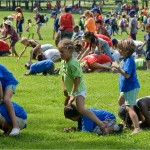More than ABCs and 123s – Music Therapy for Learning & Child Development
Nancy Saraiva
I remember when my daughter came home from school with the task of memorizing the times tables. It seemed exciting at first; it is in fact something useful in daily life and I immersed myself in drilling techniques, often using traditional tools like flash cards. Though repetition did help to kick start her learning, we came up with something else – a rhyming song using equations. Suddenly the memorizing became easier and the song ultimately led to her mastering the pesky numbers. With so many differences in children it’s amazing to see how music, whether it is singing or banging on a drum, can have such a positive effect on their learning and development. For this reason, many parents are using music therapy to tackle some challenging health and behavioural issues.
The Canadian Association for Music Therapy (www.musictherapy.ca) describes music therapy as “the skillful use of music and musical elements by an accredited music therapist to promote, maintain, and restore mental, physical, emotional, and spiritual health”. Erin Parr, a music therapist for 10 years, working with children up to age 12 in the South Surrey, Langley and Chilliwack areas, says “Music therapy allows people and children to work on specific goals in a fun and non-verbal manner. It can address fine motor skills with instruments, gross motor skills with actions songs and dances, speech and language goals with songs that target specific needs and social skills through group work and turn taking.”
Whether it is Mozart or traditional Irish music, all genres can have a beneficial effect on a child’s development, provided there isn’t negative language, which could have harmful effects on young children. “Music is essential to child development as it helps develop language and math skills as well as promoting self-esteem, listening skills and creativity,” says Parr.
Music therapy sessions differ depending on the child’s needs with various instruments, movements and songs used to achieve the outlined goals. “Sessions are often high energy and filled with fun activities that are motivating to the child,” says Parr. Music is a common string that ties people together and enables a sense of belonging and allows for creative expression.
“It is accessible to everyone and allows for all abilities to participate and interact. Just because someone cannot speak, does not mean they don’t have a lot to say,” Parr says.
For further information on music therapy, please visit the Music Therapy Association of BC at www.mtabc.com.
